Civil Liberties, Civil Rights, Crony Capitalism, Human Rights, Supreme Court, Truth to Power, Violations of U.S. and International Law
Podcast: Play in new window | Download
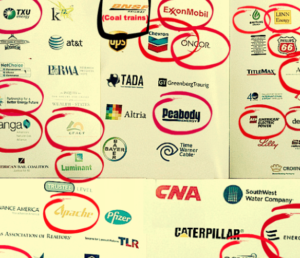
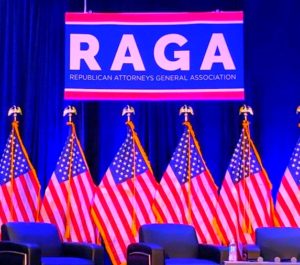
Dark Money, Corporate Corruption And Right Wing Networks
We are at a pivotal moment in this country and the coming year may will decide whether we can right the course of history. Nancy MacLean’s important book Democracy in Chains revealed the Rights‘ decades long stealth campaign to reverse engineer America back to the days when the robber barons reigned supreme and rigged the legal and constitutional rules to work in their favor.
Professor MacLean wrote that “Trump and the forces of the right are actively trying to rig the conducting and counting of elections, state by state, as they create a frightening autocratic, post truth society few would have ever thought possible in America.”
The January 6th insurrection was a dress rehearsal for a Trump coup attempt in 2024. If he loses the election Trump and his far right supporters are laying the groundwork in state legislatures to take control of the electoral process to reverse the loss and claim a victory.
The alliances between the corporate state, Trump, and white nationalists have seen a flood of dark money to subvert free and fair elections, block climate and economic justice legislation, push for a constitutional convention to permanently guarantee the rule of the rich, and the crippling of the federal government’s ability to protect working families, the environment, and promote equity for all.
The investigative journalism published by the Center for Media and Democracy has exposed groups on the far right like the American Legislative Exchange Council (ALEC), Heritage Action, and the Republican Attorneys General Association (RAGA) which are working hard to suppress the vote, tear down the firewall to protected our democracy in 2020 and put Trump acolytes in positions of power where they can subvert future elections.
ALECExposed.org
Guest – David Armiak who is Research Director with the Center for Media and Democracy. He has conducted extensive investigations on dark money, corporate corruption, and right wing networks, and is responsible for filing and analyzing hundreds of public records request every year.
—-
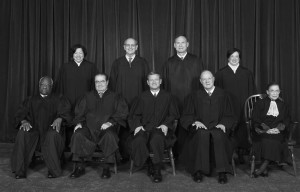
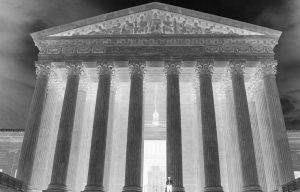
The US Supreme Court And US Democracy Going Forward
The Supreme Court as presently constituted has six reactionary judges and three liberal minded ones. Progressive people are alarmed by its recent decisions and fearful of what it will do in the future.
One of the liberals on the court is Steven Breyer. He’s 83 years old. Should he retire, it would give the Democrats the opportunity to try to appoint a replacement who is not a reactionary. This will be an uphill battle, but it is a fight well worth it.
A right-winger will certainly get the job if a Republican president and a Republican controlled Senate in the year 2024 choose a successor to Breyer if he dies or retires
When Barack Obama was president, he hinted to the liberal Ruth Bader Ginsburg, who was 80 years old and a two-time cancer patient, to step down but she declined. Ginsburg died while still serving as a Justice of the Supreme Court. Republicans in the Senate would not allow a vote for Judge Merrick Garland, whom Obama had nominated for the Supreme Court seat. Ginsburg was then replaced by the young right-winger Brett Kavanaugh who joined two other young right-wing Trump judges.
The Trump-dominated Republican party is well aware that to topple democracy they must take over the courts. The current Roberts Court has for more than a decade consistently leveled this attack on democracy by eviscerating the Voting Right Act, unleashing unlimited corporate monies into elections, allowed clearly partisan gerrymandering of elections, and is now training its sights against reproductive choice by severely restricting abortion rights.
Yale historian Jason Stanley has recently written, “There is every reason to believe that the court will allow even the simplest of democracy to crumble as long as laws are passed by gerrymandered republican state houses that make anti-democratic practices, including stealing elections, legal.”
Guest – attorney Martin Garbus, a constitutional litigator who has represented Steven Donziger, Nelson Mandela, Daniel Ellsberg, and Lenny Bruce.

———————————————-
Civil Liberties, Civil Rights, Human Rights, U.S. Militarism, Violations of U.S. and International Law
Podcast: Play in new window | Download
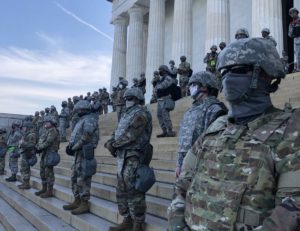
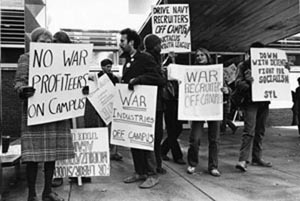
Code Pink: U.S. Military’s Unwarranted Influence
In 1961, President Eisenhower warned America of the “unwarranted influence of the military-industrial complex. Later in the ‘60’s Senator J. William Fulbright spoke of what he named the “military-industrial-academic complex.” And he was both prescient and wise to do so, for today colleges and universities in America receive nearly 200 Billion dollars annually from the Department of Defense to do research and development for the military. And this money plays an oversized role in how our colleges and universities are funded today.
Indeed, as you will hear in a few moments from today’s guest on this topic, the influence of this DoD money on what is researched and taught at America’s colleges and university is profound. And it contributes greatly to our pro-war politics while denying money and research for addressing problems like climate change, and curing new diseases, or finding new ways to fight poverty, or better educate our children. And with this year’s Pentagon budget topping $768 billion, this should concern all who seek a more peaceful world and a world where economic and social justice prevail.
Currently, 2,500 of the main institutions of higher learning in America receive this DoD’s blood money for military related research. And often little is known by way of just what is being researched and developed for the military on our campuses; of knowing what new ways to kill people are on the drawing board. For example, I must confess that in preparing for today’s show I learned, to my utter disgust, that the University of Michigan, my undergraduate alma matter, ranks 2 or 3 among the American universities receiving money from the Department of Defense.
Guest – Marcy Winograd is the Coordinator of CODE PINK CONGRESS, Co-Chair of the Progressive Democrats of America’s End Wars and Occupations Team, and herself a former candidate for Congress. She is an expert on the military-industrial-academic complex, as well as a long-time activist for peace and social justice.
—-


The U.S. Military And Climate Change
Although the U.S. military has called climate change an “existential” threat to national security, its actions belie its words. The U.S. military is the largest institutional source of greenhouse gases in the world. But due to a loophole in the 2015 Paris climate agreement and the Kyoto Protocol, it is not required to disclose the extent of its pollution. Moreover, the 2021 budget calls for the Pentagon to report on the U.S. greenhouse gas emissions for the past 10 years. But the Pentagon missed its July deadline.
In 2020, the U.S. military emitted 51 million tons of carbon dioxide, primarily from fuel and the maintenance of over a half million buildings, according to the Cost of War Project at Brown University. Significantly, the U.S. wars in Iraq and Afghanistan emitted 1.2 billion tons of greenhouse gases between 2001 and 2017. Those wars cost U.S. taxpayers $8 trillion and killed 900,000 people.
But the U.S. government’s commitment to reduce emissions falls short of the goals of the Paris agreement. The U.S. efforts were rated “insufficient” by the Climate Action Tracker. If other countries follow suit, the temperature would rise by 2 to 3 degrees Celsius, which would prove disastrous.
In November, more than 100,000 people participated in demonstrations at the United Nations Climate Change Convention (COP 26) in Glasgow, Scotland. Upwards of 500 delegates to the convention had ties to the fossil fuel industry. The watered-down statement that came out of COP 26 called for a “phase-down of unabated coal power and inefficient fossil fuel subsidies” rather than the “phase-out of fossil fuels.”
En-ROADS
Dr. Jim Rine is an adjunct professor of geology at Wayne State University, who for decades has published his research on marine geology, environmental geology, and the potential interactions of the U.S. petroleum industry to climate change. In 2019, he helped form the Veterans for Peace Climate Crisis and Militarism National Project. The project helped draft H. Res. 767, which Rep. Barbara Lee (California) introduced in the House of Representatives in November.
Veterans For Peace Climate Crisis Take Action
H. Res. 767, which has 31 co-sponsors, calls on the Defense Department to report on its emissions, to set “clear” annual emissions reductions targets, and to pledge to conduct “strict, transparent, and independently verified reporting” on emissions. The resolution also incorporates the House version of the 2022 National Defense Authorization Act that says, “DoD should lower its emissions to prevent exceeding an increase in global temperature by 1.5 degrees Celsius.”

—————————-
CIA Sponsored Terror, Civil Liberties, Civil Rights, Human Rights, Truth to Power, U.S. Militarism, Violations of U.S. and International Law
Podcast: Play in new window | Download
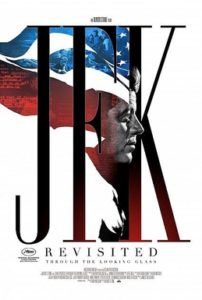
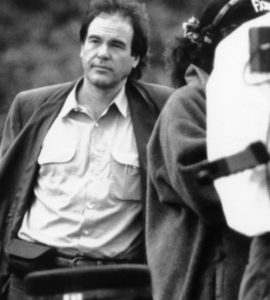
JFK Revisited: Through the Looking Glass
President John F. Kennedy was assassinated on November 22, 1963, 58 years ago. Assassination is a political murder. His murder was a turning point in American history. The first question needed to be ask in a murder case is why. The second question is who.
Today we discuss this catastrophic turn in American history with filmmaker Oliver Stone who directed his just released new documentary JFK Revisited: Through the Looking Glass. Stone uses evidence from the “Assassination Record Review Board“ to bolster our understanding that the assassination was not accomplished by a lone individual, Lee Harvey Oswald.
Kennedy was killed because he was pushing for the detente. He wanted to end the nuclear arms race with the Soviet Union. He wanted to get American troops out of Vietnam and end its counterrevolutionary involvement.
President Kennedy wanted to re-establish relations with Castro and revolutionary Cuba. He wanted to support the independent former colonial countries like the Congo. It was for this that he was murdered and the course of American history was changed.
One of the first things the new president Lyndon Johnson did – he had been Kennedy‘s Vice President – after he was installed, was to reverse Kennedy‘s order initiating the withdrawal of American troops in Vietnam. Instead Johnson escalated the war, eventually putting a half million American soldiers on the ground in that tragically ravished country, killing some 3 million Vietnamese people, including 53,000 American soldiers.
Guest – Oliver Stone, filmmaker, author, his 1991 movie “JFK“ was nominated for four Oscars, winning two of them. His new documentary JFK Revisited : Through the Looking Glass has been pretty much ignored by the mainstream American media.
—-


The Trend Toward Water And Waste Privatization
By 2025, two-thirds of the world’s population will be out of fresh drinking water, according to the World Bank. Fortune magazine recently called water “the oil of the 21st century.”
This situation has private companies flocking to privatize water delivery in areas parched for water. Rather than helping to protect existing water supplies, increase conservation measures, stem pollution, and assist needy populations, pressure mounts to commodify and profit from this natural resource and most fundamental human need.
Similarly, the National Waste and Recycling Association supports privatizing waste and recycling collection services at all levels of government. And Americans produce a lot of waste: on average at least 4.4 pounds each a day, or at least 728,000 tons total per day.
Private water companies have existed in the US for more than 200 years; today there are thousands serving more than 73 million Americans. And as of 1995, half of the nation used private waste management companies. But that’s one of the most dangerous jobs in the nation, with often lax job safety: in NYC private sanitation trucks killed 7 people in 2017; city municipal sanitation trucks haven’t killed anyone since 2014.
Privatization often brings rate hikes, decreased water quality, less reliability, and poor customer service. The average US community with privatized water paid 59 percent more than those with government supplied water. New Jersey has more private water systems than most states, and they charged 79% more. In Illinois, they charged 95% more.
Private water corporations have also been implicated in environmental disasters. The French multinational, Veolia, issued a report in 2015 certifying that Flint, Michigan’s water system met EPA standards, but neglected to mention high lead concentrations.
Guest – Attorney Terry Lodge is from Toledo where he specializes in environmental and energy issues. He is associated with the nonprofit Community Environmental Legal Defense Fund, which offers free and affordable legal services.
Guest – Lindsey Schromen-Wawrin an attorney at Shearwater Law PLLC also affiliated with Community Environmental Legal Defense Fund since 2013, He serves as a city councilor in Port Angeles, Washington, and is a member of the International Parliamentary Alliance for the Recognition of Ecocide.

——————————————-
Civil Liberties, Civil Rights, Human Rights, Iraq War, Truth to Power, Violations of U.S. and International Law, War Resister, Whistleblowers
Podcast: Play in new window | Download
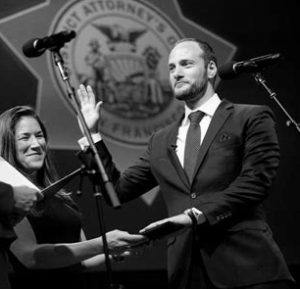
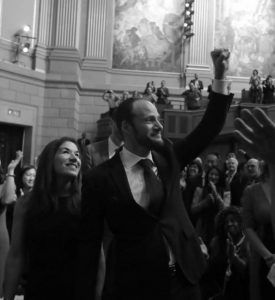
Recalling San Francisco District Attorney Chesa Boudin
Chesa Boudin has been serving San Franciscans as their district attorney for nearly 2 years. He is a leading progressive in what has been called the progressive prosecutors’ movement. Other progressive district attorneys in that small cohort are George Gascon in Los Angeles and Larry Krasner in Philadelphia.
In Berger v. United States, the Supreme Court said that the duty of a prosecutor “in a criminal prosecution is not that it shall win a case, but that justice shall be done.” Yet all too many prosecutors are more concerned with winning cases than doing justice, which includes the protection of constitutional rights.
Chesa campaigned by proposing solutions to the disaster of mass incarceration, the civil rights issue of our time. He introduced policies of diversion and no cash bail. He put fewer juveniles behind bars. He opposed the death penalty and focused his efforts on helping victims of crimes. Chesa Boudin said that the recall effort is about criminal justice reform, that it is “a question of whether we are going to go forward and continue to implement data driven policies that center on crime victims, that invest in communities impacted by crime, and that use empirical evidence to address root causes of crime in our communities or if we are going to go back to the failed policies of Reagan and Trump.”
Chesa’s efforts are now being challenged. A claimed 83,000 signatures were gathered in San Francisco by paid workers to put a recall Boudin question on the San Francisco county ballot in June. Even Donald Trump has injected himself into the campaign in what has become a national well-funded Republican putsch.
ChesaBoudin.org
Fear mongering is employed to create a false conception that crime in San Francisco is rising. Today, my co-host Marjorie Cohn, a former criminal defense attorney and law professor, and I talk with Chesa Boudin about his philosophy and successful efforts as a progressive prosecutor.
—-


Decision To Not Extradite Julian Assange To U.S. Reversed
A devastating decision, the worst decision against free journalism in modern U.S. history came down on December 10th from a British appellate court against Julian Assange. It will abolish “National security“ journalism everywhere giving United States the power to reach across oceans and indict journalists and publishers who publish stories exposing and embarrassing the U.S. government. This is what Julian did.
The horrible but not unexpected decision reversed the decision of Vanessa Baraitser, the lower court judge who had refused a U.S. Government request to extradite Julian and send him to the Eastern District of Virginia where he will be put on trial for 17 counts under the 1917 Espionage Act. The charges stem from WikiLeaks’ 2010 revelations of U.S. war crimes. It is unlikely he could receive a fair trial in that most conservative district where most of the so-called War on Terror cases have been tried.
The lower court judge had ruled that the conditions of imprisonment in a U.S. prison are so egregious that Assange, who is in very frail mental health, would likely take his own life. He had already tried to do so in the wretched London Belmarsh prison where he is now being held in torturous solitary confinement.
When Baraitser’s decision came down, the United States was quick to offer so-called “assurances“ to the appellate court that Assange would not be sent to the maximum security prison in Florence, Colorado and would not be subjected to special administrative measures which would cut him off from human contact. It was these assurances on which the appellate court relied in overturning the lower court’s decision.
Julian Assange was a young computer genius, an Australian citizen, who figured out a way to receive information from whistle blowers and publish that truth telling material anonymously in order to protect them.
When he began publishing WikiLeaks, Assange won awards for his journalism. He exposed U.S. war crimes in Afghanistan, Iraq, and Guantánamo. He embarrassed the Democratic Party by showing how Hillary Clinton stole the nomination from Bernie Sanders.
When Mike Pompeo was Trump’s CIA director, he called WikiLeaks “a hostile non-state intelligence agency” and CIA officials suggested that Assange be kidnapped from the Ecuadorian embassy in London, where he had received political asylum, and assassinated.
It was to the United States that the British High Court had no hesitation in sending Julian. So can the U.S. government’s assurances be trusted? Probably not, as they have reneged on nearly identical assurances in the past.
Meanwhile Julian Assange sits in isolation in Belmarsh prison in failing physical and mental health. His lawyers will appeal the decision to the British Supreme Court. But in the meantime, the United States has Julian exactly where they want him in the upcoming months or years that an appeal would take.
U.S. smearing, persecution, and isolation of Julian Assange has been going on now for 10 years. The sordid story began a decade ago when the US Department of Defense took the position that Julian should be discredited and slandered. He was falsely blamed for sexual misconduct in Sweden involving two women who never wanted Julian targeted. But the United States was able to get a prosecutor who did. A warrant was sent from Sweden to England requesting that Julian be sent to Sweden for questioning.
Our own Michael Ratner was representing Julian at the time. In an attempt to avoid being sent to Sweden, which would have extradited Julian to the United States for trial under the Espionage Act, Julian was granted political asylum in the tiny apartment that serves as the Ecuadorian embassy in London. He remained there for seven years under the direct video surveillance 24 hours a day by the CIA
Then the U.S. bribed and bullied its way to reverse the grant of asylum after a U.S.-friendly president assumed the helm of the Ecuadorian government. The British police brutally extracted him from the embassy and put him in solitary confinement in the notorious London Belmarsh prison, where he has remained for nearly 3 years.
Then the Trump administration brought the Espionage Act charges against him. Biden had referred to Julian as “a high-tech terrorist,” and his administration continued Trump’s historically unprecedented pursuit of Assange.
AssangeDefense.org
Guest – Chris Hedges whose many books and brilliant journalism have caused him to be respected as a moral philosopher. He is a regular columnist for Scheerpost” and is host of the show On Contact. Chris’ most recent article on the decision to extradite Julian Assange.

——————————————-
Civil Liberties, Civil Rights, Racist Police Violence, Supreme Court, Violations of U.S. and International Law
Podcast: Play in new window | Download
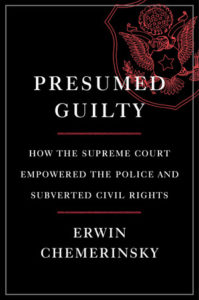

Presumed Guilty: How the Supreme Court Empowered the Police and Subverted Civil Rights
Erwin Chemerinksy is the Jesse H. Choper Distinguished Professor of Law and Dean of the Berkeley Law School. He has also served on the faculties of USC Law School and Duke Law School, and he was the founding dean of the UC Irvine School of Law.
Dean Chemerinsky is a leading constitutional law scholar and teacher who has an uncommon ability to explain complex legal concepts so that non-lawyers can easily understand them. A study of legal publications between 2016 and 2020 found him to be the most frequently cited US legal scholar. He is the author of 14 books, including leading casebooks and treatises about constitutional law, criminal procedure, and federal jurisdiction. Dean Chemerinsky also handles legal cases, and has argued several times before the Supreme Court.
After a 2000 review of the Rampart scandal about corruption and excessive force in the LA Police Department attributed the problems to a few bad apples, Dean Chemerinsky conducted an independent analysis which uncovered systemic and structural issues in the department. In his new book, Presumed Guilty: How the Supreme Court Empowered the Police and Subverted Civil Rights, he writes, “Race has infected policing in the United States since its founding.” People of color are more likely than whites to be stopped, arrested and subjected to police violence.
Dean Chemerinsky cites the slave patrols which tracked and returned runaway slaves. We saw the three men who killed Black jogger Ahmaud Arbery use the logic of those slave patrols in their defense. Due in large part to a video of the killing, they were convicted of murder.
When I served as a commentator for CBS News during the O.J. Simpson trial, the people at KNX Radio called Erwin (who did frequent commentary) “the nicest guy in the world.” He is most generous in sharing his expertise. I can’t remember any time he has turned me down when I have asked him to speak at an event, even if it required traveling to San Diego. I have often said that if I were President of the United States, Erwin would be my first choice for a justice of the Supreme Court. Unlike most of the members of the Court, he would be a “justice” in the true sense of the word.
—-
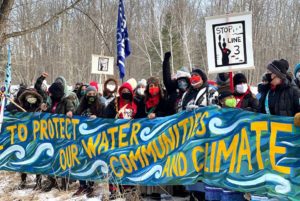
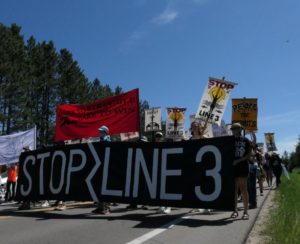
Line 3 Is The New Standing Rock
Our guest today is water protector Chicago attorney Pat Handlin. She has been representing some of the 900 people who’ve been arrested for trying to stop Line 3. Line 3 brings the dirtiest oil on Earth down from Alberta, Canada to the shores of the Great Lakes. It is owned by the Canadian corporation Enbridge. President Trump issued their permit without any environmental impact statement. The governor of Minnesota or the President of United States you can stop Enbridge. But they haven’t.
The Line 3 oil pipeline has been operational since October. It snakes under 200 bodies of water including the Mississippi river. Native Americans from the Chippewa and Ojibwe tribe have treaty rights to the land affected by the Enbridge pipeline. Enbridge has a terrible record for oil spills, 194 of them since the year 2000. Since 1986, more than 7 million gallons have spilled in the Midwest. Much of it has never been cleaned up.
The pipeline runs through sacred land. The land has wild rice which the Native Americans harvest for nutrition and value for spiritual reasons. The land is protected by treaties which are being violated. Tribes are sovereign nations that have entered into treaties with United States. A treaty becomes the supreme law of the land. Biden has said that he would honor the treaties but has not done so.
Guest – Pat Handlin is a criminal defense attorney who represented numerous Water Protectors facing misdemeanor charges stemming from the Standing Rock No DAPL movement, provided legal support at the hearing challenging TC Energy’s permit application to use water for the KXL pipeline and represents Water Protectors charged in Minnesota for opposition to Line 3. She has been a public defender, legal services attorney, administrative law judge on employment discrimination matters, represented Occupy Chicago activists, and has litigated to protect victims of elder abuse, neglect and financial exploitation.
Civil Liberties, Civil Rights, Human Rights, Truth to Power, U.S. Militarism, War Resister, Whistleblowers
Podcast: Play in new window | Download
Attorney Jim Lafferty Commentary On Rittenhouse Case
—-


Victims of Agent Orange Relief Act of 2021
The Vietnam War ended in 1975, but Vietnamese people today continue to suffer the effects of Agent Orange, the deadly dioxin-containing chemical weapon that the U.S. sprayed over 12 percent of South Vietnam from 1961-1971, poisoning both the people and the land. The defoliant was used to more effectively prosecute the war against the Vietnamese people, exposing their hideouts, destroying their crops and food.
Descendants of approximately 2 to 4 million Vietnamese people, hundreds of thousands of U.S. Vietnam veterans, and Vietnamese-Americans who were exposed to the toxin continue to record disproportionate rates of congenital disabilities and higher rates of many diseases.
U.S. veterans receive some compensation from the U.S. government, but very little assistance has been given to the Vietnamese people, who were the intended victims of the defoliant Agent Orange. Thus, on May 25, Rep. Barbara Lee (D-California) introduced H.R. 3518, the Victims of Agent Orange Relief Act of 2021, in the House of Representatives. The Vietnam Agent Orange Relief & Responsibility Campaign (for which I serve as co-coordinator) assisted Lee in drafting the bill.
Lee said, “The United States has a moral responsibility to compensate the victims of the Agent Orange campaign. In the same way we are focused on beginning to repair the damage of systemic racism in the form of reparations, and the war on drugs with restorative justice, it is also our responsibility to try and atone for this disgraceful campaign during the Vietnam War.”
Susan Schnall is co-coordinator of the Vietnam Agent Orange Relief and Responsibility Campaign. She was an active duty Navy nurse during the conflict in Vietnam and in 1969, she was tried and found guilty by general court martial of conduct unbecoming an officer for dropping anti-war flyers over military bases in the San Francisco Bay area and an aircraft, and wearing her uniform in the GI and Veterans March for Peace demonstration in San Francisco.
Guest – Susan Schnall is a member of Vietnam Veterans Against the War and the American Public Health Association. She is also President of the New York City Veterans for Peace chapter and a board member of national Veterans For Peace. Susan organized and led a delegation of Science/Public Health professionals to Vietnam in 2013 to survey the land that had been contaminated by the US use of Agent Orange/dioxin and visit the people who had been harmed by the chemicals. In 2006, Susan was awarded the medal for peace and friendship between peoples by the Vietnam Union of Friendship Organizations.
—-


The U.S. Role In Cuba Destabilization
First the Trump and now the Biden administration have accelerated their efforts to destabilize and overthrow the Cuban socialist government with the aim of reestablishing capitalism on the island.
This effort is 62 years old going back to 1959 when a popular revolution lead by Fidel Castro and Che Guevara succeeded in getting rid of the U. S. imposed dictator Batista. The still popular revolution has improved the lives of the Cuban people. Back in 1959 Cuba was a U S. colony. Its resources were owned by US corporations, its dictatorial government was a puppet of the United States.
The population, both urban and rural, was desperately poor. These were the people who made the revolution. The new government instituted land reform. They offered to pay the US corporations for the value of the land. The corporations refused so the Cuban government nationalized the land and re-distributed it to the peasantry, as was their legal right.
In retaliation, the US-owned oil refinery was shut down, crippling the Cuban economy. So the Cubans nationalized the oil refinery, the telephone company, the nickel mines and so on. This all came under control of the Cuban people. This is the essence of the Cuban revolution. The US Government immediately instituted its policy, which continues to this day, of isolation and aggression. It started in 1960, a year after revolution. President Dwight D Eisenhower, pursuant to a 1960 memo written by a senior state department official, the US Government instituted a financial, economic, and commercial blockade of Cuba which is enshrined in our law and continues to this day.
Trump introduced some 200 new measures to overthrow the Cuban revolution. Biden continued this effort with even more measures. The US government and its counter-revolutionary supporters in South Florida promoted the recent July 11 demonstrations in cities throughout the island. These demonstrations were joined by many Cubans who have valid criticisms about bureaucracy, mismanagement, and corruption in the Cuban government. For example, there are long lines people have to wait in to buy food and a lot of items are unavailable.
The situation of the Cuban people is one of hardship brought about by the 60 year old commercial and economic blockade set up at United States. Their suffering has been further exacerbated of course by the pandemic. Cubans suffer a shortage of food and medicine and a blow to the economy which was largely based on tourism. The US counter-revolutionary efforts involve a massive spending of money on social media and a direct role in organizing opponents of the Cuban government. After the July demonstrations a new one was planned for November 15. It was a total flop.
Guest – Attorney Art Heitzer, author and head of the Cuba subcommittee of the National Lawyers Guild.
—–
























